 W
WIn ordinary language, a crime is an unlawful act punishable by a state or other authority. The term crime does not, in modern criminal law, have any simple and universally accepted definition, though statutory definitions have been provided for certain purposes. The most popular view is that crime is a category created by law; in other words, something is a crime if declared as such by the relevant and applicable law. One proposed definition is that a crime or offence is an act harmful not only to some individual but also to a community, society, or the state. Such acts are forbidden and punishable by law.
 W
WIn many legal jurisdictions related to English common law, affray is a public order offence consisting of the fighting of one or more persons in a public place to the terror of ordinary people. Depending on their actions, and the laws of the prevailing jurisdiction, those engaged in an affray may also render themselves liable to prosecution for assault, unlawful assembly, or riot; if so, it is for one of these offences that they are usually charged.
 W
WBlockbusting is a business process in which U.S. real estate agents and building developers convince white property owners to sell their houses at low prices, which they do by telling house owners that racial minorities will soon move into their neighborhoods in order to instill fear in them. The agents then sell those same houses to black families who are desperate to escape overcrowded ghettos at much higher prices. Blockbusting became possible after the legislative and judicial dismantling of legally protected racially segregated real estate practices after World War II. By the 1980s it largely disappeared as a business practice, after changes in law and the real estate market.
 W
WBody snatching is the secret removal of corpses from burial sites. A common purpose of body snatching, especially in the 19th century, was to sell the corpses for dissection or anatomy lectures in medical schools. Those who practised body snatching were often called "resurrectionists" or "resurrection-men". A related act is grave robbery, uncovering a tomb or crypt to steal artifacts or personal effects that had been buried with the deceased; however, grave robbery differs from body snatching in that grave robbing does not involve stealing the corpse itself.
 W
WChild abuse or child maltreatment is physical, sexual, and/or psychological maltreatment or neglect of a child or children, especially by a parent or a caregiver. Child abuse may include any act or failure to act by a parent or a caregiver that results in actual or potential harm to a child, and can occur in a child's home, or in the organizations, schools or communities the child interacts with.
 W
WCorrupt practices in English election law includes bribery, treating, undue influence, personation, and aiding, abetting, counselling and procuring personation.
 W
WCriminal damage in English law was originally a common law offence. The offence was largely concerned with the protection of dwellings and the food supply, and few sanctions were imposed for damaging personal property. Liability was originally restricted to the payment of damages by way of compensation.
 W
WCruelty to animals/Animal Abuse, also called animal abuse, animal neglect or animal cruelty, is the infliction by omission (neglect) or by commission by humans of suffering or harm upon any non-human animal. More narrowly, it can be the causing of harm or suffering for specific achievement, such as killing animals for entertainment; cruelty to animals sometimes encompasses inflicting harm or suffering as an end in itself, defined as zoosadism.
 W
WDesertion is the abandonment of a military duty or post without permission and is done with the intention of not returning. This contrasts with unauthorized absence (UA) or absence without leave, which are temporary forms of absence.
 W
WDomestic violence is violence or other abuse in a domestic setting, such as in marriage or cohabitation. Domestic violence is often used as a synonym for intimate partner violence, which is committed by a spouse or partner in an intimate relationship against the other spouse or partner, and can take place in heterosexual or same-sex relationships, or between former spouses or partners. In its broadest sense, domestic violence also involves violence against children, teenagers, parents, or the elderly. It takes a number of forms, including physical, verbal, emotional, economic, religious, reproductive, and sexual abuse, which can range from subtle, coercive forms to marital rape and to violent physical abuse such as choking, beating, female genital mutilation, and acid throwing that results in disfigurement or death. Domestic murders include stoning, bride burning, honor killings, and dowry deaths.
 W
WDomestic violence against men deals with domestic violence experienced by men in a domestic setting, such as in marriage or cohabitation. As with domestic violence against women, violence against men may constitute a crime, but laws vary between jurisdictions.
 W
WDriving under the influence (DUI) is the offense of driving, operating, or being in control of a vehicle while impaired by alcohol or other drugs, to a level that renders the driver incapable of operating a motor vehicle safely.
 W
WDrunk driving is the act of driving under the influence of alcohol. A small increase in the blood alcohol content increases the relative risk of a motor vehicle crash.
 W
WExtortion is the practice of obtaining benefit through coercion. In most jurisdictions it is likely to constitute a criminal offense; the bulk of this article deals with such cases. Robbery is the simplest and most common form of extortion.
 W
WA fence, also known as a receiver, mover, or moving man, is an individual who knowingly buys stolen goods in order to later resell them for profit. The fence acts as a middleman between thieves and the eventual buyers of stolen goods who may not be aware that the goods are stolen. As a verb, the word describes the behaviour of the thief in the transaction. This sense of the term came from thieves' slang tracing from the notion of such transactions providing a defence against being caught. The term remains in common use in all major dialects of modern English, all of which spell it with a "c" even though the source word in some dialects is now spelled defense.
 W
WA forced disappearance occurs when a person is secretly abducted or imprisoned by a state or political organization, or by a third party with the authorization, support, or acquiescence of a state or political organization, followed by a refusal to acknowledge the person's fate and whereabouts, with the intent of placing the victim outside the protection of the law.
 W
WIn law, fraud is intentional deception to secure unfair or unlawful gain, or to deprive a victim of a legal right. Fraud can violate civil law, a criminal law, or it may cause no loss of money, property or legal right but still be an element of another civil or criminal wrong. The purpose of fraud may be monetary gain or other benefits, for example by obtaining a passport, travel document, or driver's license, or mortgage fraud, where the perpetrator may attempt to qualify for a mortgage by way of false statements.
 W
WHair theft has been a recurrent problem in various parts of the world where human hair is in demand either for commercial products such as wigs and hairpieces, or for sexual fetishes. As hair has a high commercial value – in the mid-19th century it was regarded as worth twice its weight in silver – opportunist thieves have targeted long-haired women, and less commonly men and children, with the aim of stealing their hair. Hair thieves have typically sought either to surreptitiously cut off hair in public places, or have mugged people and shorn their heads. The crime of hair theft has been widely reported in North America, Europe, Asia and Australasia over the course of at least 300 years.
 W
WHazing, initiation ceremonies, bastardisation, ragging, or deposition, refers to any activity expected of someone in joining or participating in a group that humiliates, degrades, abuses, or endangers them regardless of a person's willingness to participate.
 W
WHomicide is the act of one human killing another. A homicide requires only a volitional act by another person that results in death, and thus a homicide may result from accidental, reckless, or negligent acts even if there is no intent to cause harm. Homicides can be divided into many overlapping legal categories, including murder, manslaughter, justifiable homicide, killing in war, euthanasia, and capital punishment, depending on the circumstances of the death. These different types of homicides are often treated very differently in human societies; some are considered crimes, while others are permitted or even ordered by the legal system.
 W
WIdentity cleansing is defined as "confiscation of personal identification, passports, and other such documents in order to make it difficult or impossible for those driven out to return".
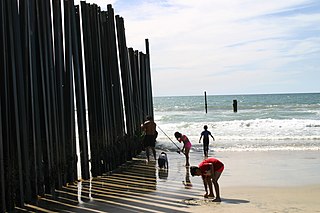 W
WIllegal entry is the act of foreign nationals arriving in or crossing the borders into a country in violation of its immigration law. Human smuggling is the practice of aiding people in crossing international borders for financial gain, often in large groups. Human smuggling is associated with human trafficking. A human smuggler will facilitate illegal entry into a country for a fee, but on arrival at their destination, the smuggled person is usually free. Trafficking involves physical force, fraud, or deception to obtain and transport people, usually for enslavement or forced prostitution.
 W
WIllegal immigration refers to the migration of people into a country in violation of the immigration laws of that country, or the continued residence without the legal right to live in that country. Illegal immigration tends to be financially upward, from poorer to richer countries. Illegal residence in another country creates the risk of detention, deportation, and/or other sanctions.
 W
WAn impersonator is someone who imitates or copies the behavior or actions of another. There are many reasons for impersonating someone:Entertainment: An entertainer impersonates a celebrity, generally for entertainment, and makes fun of their personal lives, recent scandals and known behavior patterns. Especially popular objects of impersonation are Elvis Presley, Michael Jackson(see Michael Jackson impersonator), Abraham Lincoln, and Lenin. Entertainers who impersonate multiple celebrities as part of their act, can be sorted into impressionists and celebrity impersonators. Crime: As part of a criminal act such as identity theft. This is usually where the criminal is trying to assume the identity of another, in order to commit fraud, such as accessing confidential information, or to gain property not belonging to them. Also known as social engineering and impostors. Decoys, used as a form of protection for political and military figures. This involves an impersonator who is employed to perform during public appearances, to mislead observers. Sowing discord, causing people to fight, or dislike each other for social, business or political gain. Companionship: a rental family service provides actors portraying friends or family for platonic purposes.
 W
WSixteen European countries and Israel have laws against Holocaust denial, the denial of the systematic genocidal killing of approximately six million Jews in Europe by Nazi Germany in the 1930s and 1940s. Many countries also have broader laws that criminalize genocide denial. Among the countries that ban Holocaust denial, Austria, Germany, Hungary and Romania also ban other elements associated with Nazism, such as the display of Nazi symbols.
 W
WLèse-majesté, a French term meaning "to do wrong to majesty", is an offence against the dignity of a reigning sovereign or against a state.
 W
WLoitering is the act of remaining in a particular public place for a protracted time, without any apparent purpose.
 W
WLotoko, also known by the slang term "pétrole", is a home-distilled alcoholic drink or "moonshine" in the Democratic Republic of the Congo.
 W
WMoonshine was originally a slang term for high-proof distilled spirits that were and continue to be produced illicitly, without government authorization. Distilling such spirits outside a registered distillery remains illegal in the United States and most countries around the world. In recent years, however, commercial products labeled as moonshine have seen a resurgence of popularity.
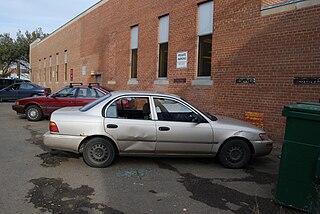 W
WMotor vehicle theft is the criminal act of stealing or attempting to steal a motor vehicle. Nationwide in the United States in 2012, there were an estimated 721,053 motor vehicle thefts, or approximately 229.7 motor vehicles stolen for every 100,000 inhabitants. Property losses due to motor vehicle theft in 2012 were estimated at $4.3 billion. 15,037 cars with comprehensive insurance were stolen in Germany in 2018 alone. This evens out to one stolen car every 35 minutes. Car thieves caused losses of 298 million euros.
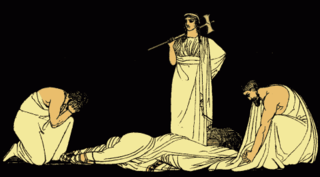 W
WMurder is the unlawful killing of another human without justification or plausible/moral intent, especially the unlawful killing of another human with malice aforethought. This state of mind may, depending upon the jurisdiction, distinguish murder from other forms of unlawful homicide, such as manslaughter. Manslaughter is killing committed in the absence of malice, brought about by reasonable provocation, or diminished capacity. Involuntary manslaughter, where it is recognized, is a killing that lacks all but the most attenuated guilty intent, recklessness.
 W
WMutiny is a revolt among a group of people to oppose, change, or overthrow an organization to which they were previously loyal. The term is commonly used for a rebellion among members of the military against an internal force, but it can also sometimes mean any type of rebellion against any force. Mutiny does not necessarily need to refer to a Military Force and can describe a political, economic, or Power structure in which there's a change of power.
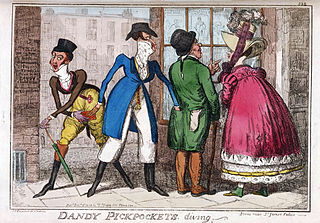 W
WPickpocketing is a form of larceny that involves the stealing of money or other valuables from the person or a victim's pocket without them noticing the theft at the time. It may involve considerable dexterity and a knack for misdirection. A thief who works in this manner is known as a pickpocket.
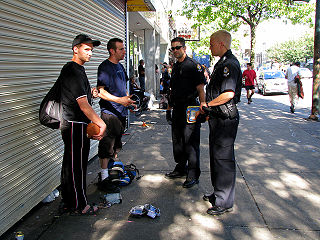 W
WPossession of stolen goods is a crime in which an individual has bought, been given, or acquired stolen goods.
 W
WUnder the law of Scotland, mobbing, also known as mobbing and rioting, is the formation of a mob engaged in disorderly and criminal behaviour. The crime occurs when a group combines to the alarm of the public "for an illegal purpose, or in order to carry out a legal purpose by illegal means, e.g. violence or intimidation". This common purpose distinguishes it from a breach of the peace.
 W
WThis is a list of criminal acts intentionally involving radioactive substances. Inclusion in this list does not necessarily imply that anyone involved was guilty of a crime. For accidents or crimes that involved radioactive substances unbeknownst to those involved, see the Nuclear and radiation accidents and incidents.
 W
WSabotage is a deliberate action aimed at weakening a polity, effort, or organization through subversion, obstruction, disruption, or destruction. One who engages in sabotage is a saboteur. Saboteurs typically try to conceal their identities because of the consequences of their actions and to avoid invoking legal and organizational requirements for addressing sabotage.
 W
WShoplifting is the theft of goods from an open retail establishment, typically by concealing a store item on one's person, in pockets, under clothes, or in a bag, and leaving the store without paying. With clothing, shoplifters may put on items from the store and leave the store wearing the clothes. The terms "shoplifting" and "shoplifter" are not usually defined in law. The crime of shoplifting generally falls under the legal classification of larceny. Shoplifting is distinct from burglary, robbery, or armed robbery. In the retail industry, the word "shrinkage" can be used to refer to merchandise lost by shoplifting, but the word also includes loss by other means, such as waste, uninsured damage to products, and theft by store employees.
 W
WStoning, or lapidation, is a method of capital punishment where a group throws stones at a person until the subject dies from blunt trauma. It has been attested as a form of punishment for grave misdeeds since ancient times. Its adoption in some legal systems has caused controversy in recent decades.
 W
WA stowaway or clandestine traveller is a person who secretly boards a vehicle, such as a ship, an aircraft, a train, cargo truck or bus.
 W
WA threat is a communicated intent to inflict harm or loss on another person. Intimidation is widely observed in animal behavior chiefly in order to avoid the unnecessary physical violence that can lead to physical damage or the death of both conflicting parties. A threat is considered an act of coercion.
 W
WTreason is the crime of attacking a state authority to which one owes allegiance. This typically includes acts such as participating in a war against one's native country, attempting to overthrow its government, spying on its military, its diplomats, or its secret services for a hostile and foreign power, or attempting to kill its head of state. A person who commits treason is known in law as a traitor.
 W
WValet boy is a term used in some countries to refer to young people who ask for fees from those who park at the roadside. Valet boys usually work in groups, and demand an RM 1-5 "parking fee" from car owners, under an agreement that they will protect the car. It is these very same valets, however, who do the vandalizing should the driver refuse to pay. This "protection" service is a form of extortion. The valet boys do not park the car for the owner; rather they direct drivers into parking lots. This practice has become common in large Brazilian cities, such as São Paulo and Rio de Janeiro, where numerous cases of "valet boys" vandalizing cars are reported every day. Similar schemes are also run in other countries although often the person is not a 'boy'. In the Philippines, however, this scheme is mostly run by street children.
 W
WVandalism is the action involving deliberate destruction of or damage to public or private property. The term includes property damage, such as graffiti and defacement directed towards any property without permission of the owner. The term finds its roots in an Enlightenment view that the Germanic Vandals were a uniquely destructive people.